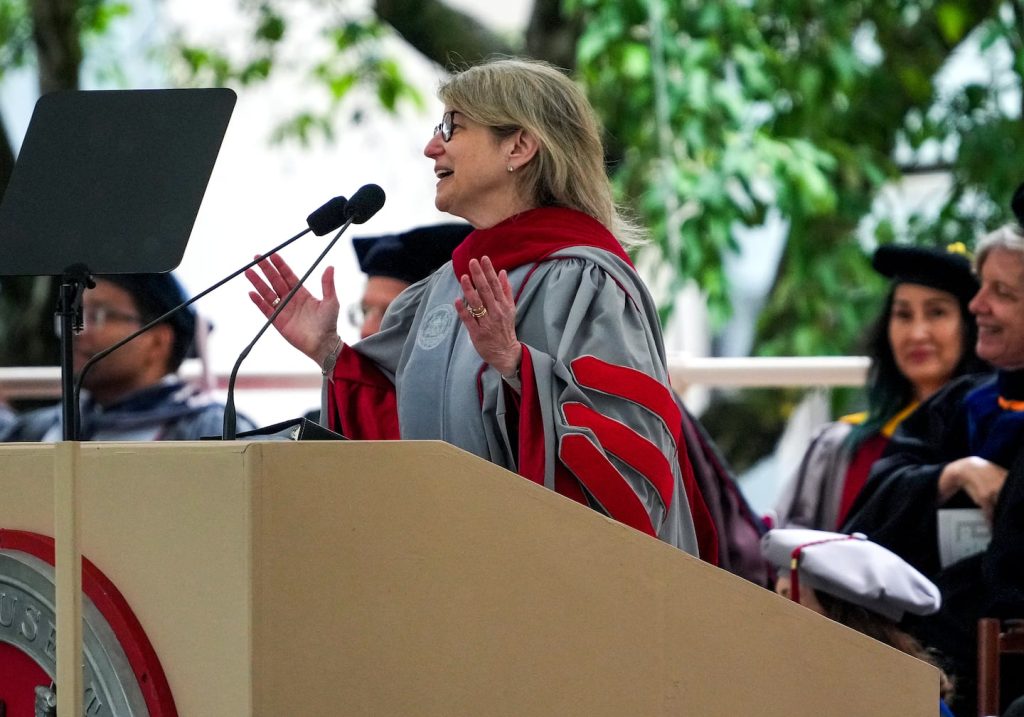Kornbluth has already established herself as a leader willing to push back against the right-wing’s attempted takeover of elite higher education. She has threaded a needle some other presidents haven’t, caught as they have been between campus unrest, faculty pressures, and looming demands from Washington.
The “compact” MIT rejected reflects Trump’s idea that higher education is deeply hostile to so-called conservative ideas.
It would require the schools to agree to such measures as limiting international student enrollment, freezing domestic tuition rates, committing to Trump-imposed definitions of gender, and doing away with departments that are deemed to be hostile to conservative ideals.
In her letter to Washington, Kornbluth noted MIT is already meeting or exceeding many of the standards the administration says it wants to impose.
She stated her main objection diplomatically, but plainly.
“The (proposed compact) also includes principles with which we disagree, including those that would restrict freedom of expression and our independence as an institution,” she wrote. “And fundamentally, the premise of the document is inconsistent with our core belief that scientific funding should be based on scientific merit alone.”
It’s hard to overstate the pressure universities are under right now. Conservatives have had higher education in their gunsights for years, and Trump has waged that war in a way that would have been unimaginable even a short while ago. He’s unleashed every weapon he can find to punish universities — especially MIT neighbor Harvard.
No one has to tell Kornbluth just how intense that war has been. She was one of three university presidents invited to serve as punching bags before a congressional committee two years ago, along with Harvard’s Claudine Gay and Penn’s Liz Magill. Within a matter of months, she was only one of the three still in her job, the only one to successfully navigate a crisis she didn’t create or deserve.
Perhaps it is true, as conservatives like to claim, that universities need to reconsider their approach to preserving and defending free speech on campus. But, make no mistake, caving to the bad-faith campaign waged by Trump and his right-wing allies will damage higher education for years.
Under the guise of fighting antisemitism, they’ve hammered colleges over issues that have no conceivable connection to antisemitism. It’s been a mere leaf for waging a faux-populist battle against institutions that refuse to be remade in Trump’s authoritarian, xenophobic image.
The obvious question raised by MIT’s rejection of Trump’s deal is what this will mean for Harvard and other colleges he seeks to bring to heel.
Harvard has apparently been negotiating with the regime for months. To his credit, Harvard president Alan Garber has been emphatic his university will not sacrifice fundamental basic principles of academic freedom.
Garber’s hand has been strengthened, perhaps, by a string of court victories blocking Trump’s most heavy-handed threats from taking effect. But that doesn’t mean a reckoning isn’t coming, possibly before a Supreme Court that seems inclined to let Trump do almost anything he wants.
As for MIT, even in the short term, this decision risks landing it on the enemies list of the most vindictive president in memory, with tens of millions of dollars in research funding hanging in the balance.
MIT’s rejection of the current offer might not be the end of the story, because historically Trump is relentless in pursuit of a deal. But Kornbluth deserves all the credit for standing up for her institution’s core values, even at considerable risk.
To fend off Trump’s autocratic demands, colleges and universities will need a united front. So I can only hope Kornbluth’s stand will embolden her peers to stand tall as well.
Adrian Walker is a Globe columnist. He can be reached at adrian.walker@globe.com. Follow him @Adrian_Walker.

